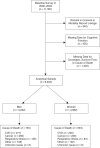Association of Cognitive Function With Cause-Specific Mortality in Middle and Older Age: Follow-up of Participants in the English Longitudinal Study of Ageing
- PMID: 26803665
- PMCID: PMC4724091
- DOI: 10.1093/aje/kwv139
Association of Cognitive Function With Cause-Specific Mortality in Middle and Older Age: Follow-up of Participants in the English Longitudinal Study of Ageing
Abstract
We examined the little-tested associations between general cognitive function in middle and older age and later risk of death from chronic diseases. In the English Longitudinal Study of Ageing (2002-2012), 11,391 study participants who were 50-100 years of age at study induction underwent a battery of cognitive tests and provided a range of collateral data. In an analytical sample of 9,204 people (4,982 women), there were 1,488 deaths during follow-up (mean duration, 9.0 years). When we combined scores from 4 cognition tests that represented 3 acknowledged key domains of cognitive functioning (memory, executive function, and processing speed), cognition was inversely associated with deaths from cancer (per each 1-standard-deviation decrease in general cognitive function score, hazard ratio = 1.21, 95% CI: 1.10, 1.33), cardiovascular disease (hazard ratio = 1.71, 95% CI: 1.55, 1.89), other causes (hazard ratio = 2.07, 95% CI: 1.79, 2.40), and respiratory illness (hazard ratio = 2.48, 95% CI: 2.12, 2.90). Controlling for a range of covariates, such as health behaviors and socioeconomic status, and left-censoring to explore reverse causality had very little impact on the strength of these relationships. These findings indicate that cognitive test scores can provide relatively simple indicators of the risk of death from an array of chronic diseases and that these associations appear to be independent of other commonly assessed risk factors.
Keywords: aging; cancer; cardiovascular disease; cognitive function; mortality; respiratory illness.
© The Author 2016. Published by Oxford University Press on behalf of the Johns Hopkins Bloomberg School of Public Health. All rights reserved. For permissions, please e-mail: journals.permissions@oup.com.
Figures



References
Publication types
MeSH terms
Grants and funding
LinkOut - more resources
Full Text Sources
Other Literature Sources
Medical

